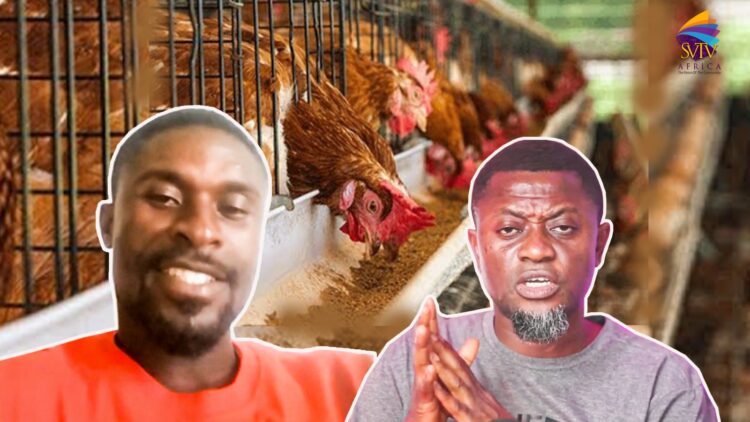Anas Mohammed: From Teaching to Thriving in Poultry Farming
Anas Mohammed is a Ghanaian poultry farmer and the founder of Anasmo Farms and Trades. He was recently featured on SVTV Africa’s Business Linkwith DJ Nyaami, where he shared his entrepreneurial journey from teaching to establishing a successful poultry business.
Originally from Asante Akyem Agogo Kyekyebiase, Anas currently resides in Konongo and describes himself as a passionate, full-time poultry farmer. He initially taught for nearly three years in Kumasi but decided to transition into poultry farming during his time at the university. His motivation stemmed from a desire to manage his own time and build something for himself, as he believed salary work consumed too much time with little personal gain.
“I don’t joke with my time,” Anas stated. “If you want to start your own business, you need capital and a proper plan. Poultry farming is good, but it’s capital-intensive.”
Anas was encouraged to enter poultry farming by his sister’s friend. Although he initially wanted to go into sachet water production, he faced challenges and decided to switch paths. In 2021, he started his poultry farm with 1,500 birds, and despite multiple setbacks—including disease outbreaks and bird mortality—he persevered. Today, he manages 5,000 birds and aims to scale up to over 20,000 in the future.
“We made a lot of mistakes,” he admitted. “At one point, we lost over 100 birds in a single week because someone mixed sand with the maize we used as feed. It cost us a lot in medicines and losses.”
According to Anas, poultry farming is not a side hustle—it requires full commitment. He emphasizes the importance of hiring knowledgeable workers and treating them well. “If you pay workers well, you buy their minds,” he said. “Don’t just hire familiar faces; if someone is lazy, sack them.”
He invests in proper infrastructure like solar power, boreholes, and battery cages, and has plans to install CCTV cameras to monitor operations. He even produces his own feed and sends any sick birds for post-mortem analysis by a veterinarian.
Anas has listed his farm on Google to make it easier for customers to locate. Demand for eggs is high, and he supplies many parts of Ghana. From 1,000 birds, he currently gets around 27 crates of eggs per day. However, he notes that the egg resellers often make more profit than the farmers.
Despite challenges, he continues to reinvest in his business. Within the next three months, he plans to sell 3,000 birds and expand his network, including exports to countries like Côte d’Ivoire.
Anas warns Ghanaians abroad who set up poultry farms in Ghana without being directly involved. He says many of those farms collapse due to dishonest or underpaid workers who misreport sales or steal produce. “Some workers claim only 10 crates were produced when they actually got 20,” he said.
He advises fellow entrepreneurs to stay involved, pay fairly, and maintain quality control.
“If you pay workers as little as GHC 400–500 and give them free food and accommodation, they’ll still find ways to steal if you’reu not monitoring,” he warned.
“Poultry farming is more profitable than teaching,” Anas said. “But you have to invest your time, energy, and money. You can’t run it like a part-time business.”
Anas currently has two workers and is cautious about taking on new customers unless he increases his bird count. His advice to aspiring farmers: “Plan well, invest wisely, and be fully involved.”
Farm Name: Anasmo Farms and Trades
Social Media Handles: Anasmo Farms and Trades
Watch The Video Below:

















